The simple answer is YES. From our own experience, the travel destinations we have visited in Africa are generally safe. Read on for our explanations.
Is it safe to travel to Africa? This is a classic question and unfortunately, the first thing everybody asks when talking about Traveling to Africa. Thanks to the portrayal of mass media, those who haven’t been can easily conjure up images of crime, violence, malaria, poverty, and tribes with spears to form a collage of Africa in their heads.
Africa and the rest of the world in a perspective
Most African countries are developing nations and this alone will have many people ask if it’s safe to travel just because more people are living with fewer means. But remember that the rest of the world has hiccups too and just because a country is less developed doesn’t automatically make it unsafe. The US has a lot of unsafe neighborhoods, some countries in Europe are constant targets of racism and terrorist attacks, Asia and the Middle East take headlines for incidents of violence.
Generally speaking, there are countries in Africa that are as developed and as safe as any other European or Western country, there are countries or cities that are not safe at all, and then most of the countries are in between these two extremes.
The problem is that the media focuses too much on the negative aspects of Africa. We use images of poor kids in western marketing campaigns: “Buy a bottle and a child in Africa can go to school”
We have seen movies set in Africa about genocide, child abuse, and slavery. This consistent portrayal of Africa as a center of pity eventually gave birth to a false generalization that just got worse through the years. This one-sided portrayals of Africa have injected fear and paranoia among travelers.
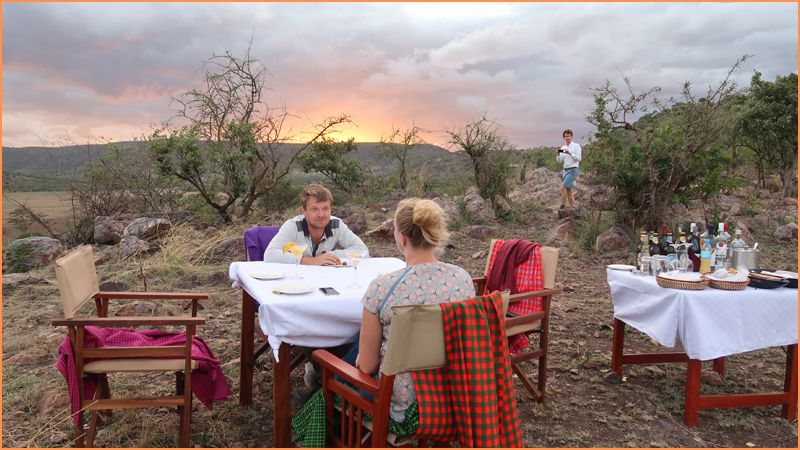
Enjoying sundowner drinks at the Serengeti, Tanzania
While these are not entirely false, what most people don’t realize is that there is so much more to Africa than the stigma attached to it. Especially if we’re talking about its tourism wonders, the part of Africa that’s often overlooked. We don’t hear it much, that Africa has very diverse cultures, full of bucket-list-worthy sites, and is home to all-year-round destinations that anyone can explore from solo travelers to elders to a family with babies and even those with limited mobility.
Sharing from personal experience
Both Martin and I have been to Africa several times for the last 3 years and visited around 10 countries. Backpacking Africa was my first ever experience as a female solo backpacker and I traveled cheap and did most of my trip DIY. When I came for the first time, I also brought with me a lifetime’s worth of paranoia. I volunteered, stayed with locals and cheap hostels. We’ve been coming back to Africa since then and went on several safaris and tours both by ourselves and through tour operators.
The Good and the Bad
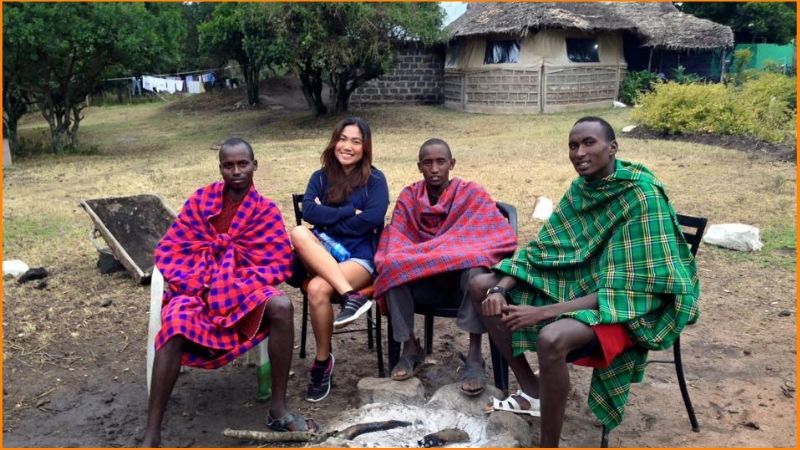
My first trip to Africa: Kenya in 2015. I’m still steady Facebook friends with one of them
As a backpacker, there were times where I was forced to go beyond my comfort zone: Keeping my calm in trying to decline a street vendor following me relentlessly; I was forced to walk kilometers because of the poor infrastructure; I had to sleep on a bus overnight to wait for the 1st trip leaving at dawn because there were no hotels I can afford; While crossing border in Mozambique, I was asked to step outside and was interviewed in a separate room of my whereabouts and that made me really nervous; At night, I wouldn’t dare go out for a walk because the darkness and eerie silence felt as if someone will grab me from behind.
Other than these, I haven’t had any share of 1st hand crime or violence until now, backpacker no more and traveling more like a regular tourist. Not even theft considering it’s pretty common. All I’ve had was great memories meeting the locals, how they helped me when it was easier not to, how they were generous despite having just enough, how they were genuinely nice to me despite my guards being up all the time.
I’m not saying nor guaranteeing that if you go to Africa now, I promise you’d be safe. What I’m saying is that Africa is not a terrible place like we were all led to believe. And that despite its challenges, many places in Africa is still generally a safe destination for tourists and with due diligence, you too can travel without having to fear for your life.
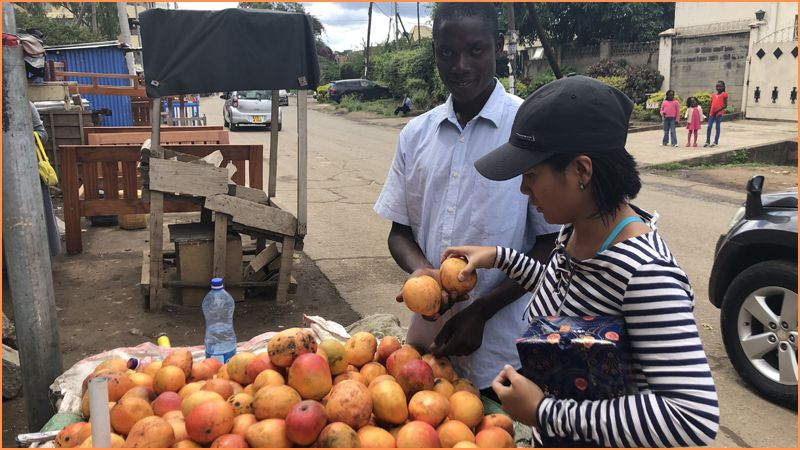
Random Fruit Vendor
Planning a Trip to Africa takes a lot more effort
Of course, some countries and/or areas are safer than others. But anyone with common sense can easily know the difference and make a travel plan just like you would in other parts of the world such as Asia or Europe. Planning a trip to Africa however, will take a lot more effort and often you’d have to rely on tour operators as DIY can be very challenging, sometimes impossible. Unlike Asia, where you can book a flight and figure things out when you arrive, say in Thailand; in Africa, you would be better off to a good start if you make your research and book your accommodation in advance.
The main reason for this is because accommodation options are not as plentiful, there aren’t wifi’s in the airport or public areas, and most importantly, the local transportation is not only limited but the timetable and routes if not available, can be unpredictable and changes all the time.
“Being able to travel safe is more about you and the choices you make”
Being able to travel safe is more about you and the choices you make more than the destination. In my case, I wouldn’t plan a trip to Sudan because it’s pretty obvious it’s not safe there for tourists at the moment. I know this by checking travel advisory from embassies like the US, Canada, and the UK. I wouldn’t flag a cab in the middle of the night, in the middle of nowhere. I would think twice before eating something that looks like an impending food poisoning. I wouldn’t entrust my luggage to a stranger. I’ve heard stories of tourists who were warned by their tour operator not to go to a certain city. They went anyway, got drunk, and came home with their valuables stolen. But you see, you already know all these precautions.
The difference is, when you travel to Europe or Asia, being a well-traveled destination, you relax a bit and keep these precautions passive in your head. In Africa, you take these precautions seriously and activate them.
Some challenges in Africa that you should know about

Game Drive Safari with a Tour Operator
- As mentioned earlier, DIY is more challenging to pull off and you would often have to rely on tour operators
- Public transportation is more difficult in terms of routes and timetables. Quality of the vehicles is also often rundown, always overloaded, and not well-maintained.
- Drivers drive for the sake of getting from point A to B with little to no care at all with the in-between. Traffic enforcers can be notorious and may stop you for no reason just to get a bribe
- There are plenty of street vendors and freelance tour guides and they can get very pushy
- Some locals and bystanders may approach you and ask if they can have money, if they can have your watch, etc.
- There are lots of mosquitoes in general everywhere but not all mosquitoes carry disease. If you come to Africa and didn’t get a bite, then you haven’t truly been to Africa
- General infrastructure is below average (limited and unreliable internet, no public toilets or if they even exist, you wouldn’t want to go in there)
- Living like a local can be boring as soon as you get off the major cities. For example, if you want to stay longer to get to know the culture (not the tourist sites), entertainment options like cinema, gyms, cozy outdoor cafes, etc… if not too limited, don’t exist
- Limited food options. You can’t expect to just go outside of your hotel and find food anywhere. You’d be lucky to find some cozy cafes but in some areas, there are only local eateries but they are “too local”
Things to consider to properly evaluate travel safety in Africa
When you decide to travel to a place, oftentimes, you start by selecting a destination, a country. If this was somewhere in Europe, say in Spain, your research would start with THINGS TO DO, FLIGHTS, etc… because a lot of people have already been there. No need to search if it’s safe to go to Madrid. You know somewhere at the base of your jetsetter brain that it’s a common destination, therefore it’s safe.
In Africa, being a less-traveled place, you simply require more testimonials, living-proof and experiences before you would even consider going there. And that’s okay.
Like everything else in life, you make decisions based on facts. The best way to do this is to take your fear and paranoia by the hand and break it down into digestible chunks:
-
See Travel Advise from Embassies and Entry Requirements
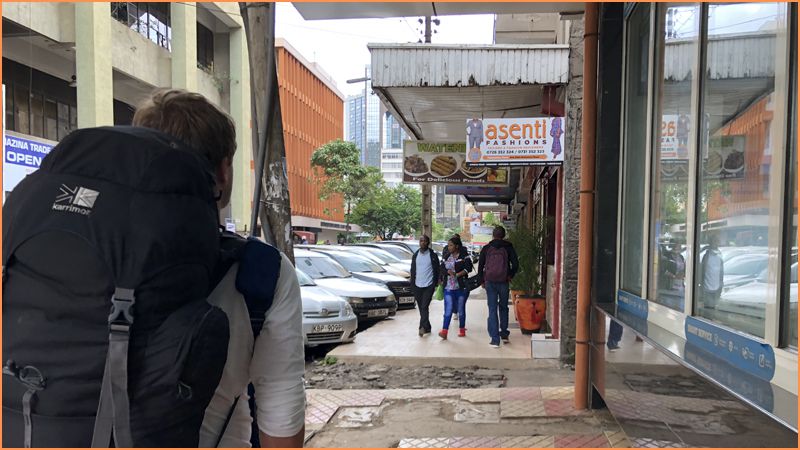
Streets of Nairobi, Kenya
Before getting too deep in your planning on which country or city to go, check travel advisories from embassies mentioned earlier. These sites usually have up to date information of all countries including those in Africa.
Also, check the entry requirements including visa and vaccinations. Some people are put off when required to have vaccinations of any sort, we only took Yellow Fever and chose not to take the malaria pills because of the nasty side effects we read about. We are still alive as of this writing.
-
Type of Travel
All tours in Africa can be arranged by a tour operator. One search and you’ll get a handful of tour providers. I suggest booking directly with a locally owned tour operator as costs would be more economical and you can be surer that your money stays in the country. Simply ensure to book from a reliable supplier. With a tour operator, you only need to worry about your flights. You’ll even be picked up in the airport on your arrival and dropped off for your departure. For bigger cities, you can also combine using a tour operator with a DIY. An example would be to use a tour operator for your Kenya Safari and go around Nairobi by yourself through Uber.
If you’re backpacking on a budget, a DIY is very doable but it would also require more planning. From point A to B, there may be lesser options for you but it’s definitely doable. You don’t have to know someone who knows someone. Just go to the bus station or ask a local.
Now, traveling with kids changes the game. You can’t have them drink a “maybe clean” water or “maybe safe” food. You would limit your activities to child-friendly ones and consider all other factors to ensure their safety and comfort. Unless you’re a seasoned backpacker and very familiar with the destination, again it would be best to book with a reliable tour operator who has a network of trusted partners such as accommodation and have years of experience in handling customers. This ensures that the meals you get are prepared safely and properly and/or the activities you embark on are well-regulated.
-
Accommodation
- Mid-range to Luxury Accommodation
- Budget to Standard Accommodation
If you travel for holidays, you either expect to have the same level of comfort you’re used to at home or more often, you want to take it up a notch. Most African countries that are promoted as a tourist destination always come with a corresponding level of accommodation for all types of travelers. Luxury travel products are aplenty while hostels may be limited in number. To get a feel of the kind of accommodation to expect, go to booking.com and type your preferred African country, don’t worry about the exact destination just yet, just the country, and see what comes up. These properties are established according to certain regulations. Though the overall quality of service can be improved, they are generally safe and secure. You can also read reviews from previous guests.
-
Activities
There are tons of activities that you can do in Africa. These are regulated as well and even if you do a DIY, you will still go through a park ranger, a concessionaire, or any form of regulating the body. Unlike in Europe where you can visit a site by simply driving up there, in Africa, you are often required to go with a local guide, even for DIY. This is because most of the routes are unmarked and would need the knowledge of a local to get by. Also, tourists traveling alone can attract attention and can be the target of scammers. Having a local guide protects you not just from being scammed but from the potential harassment of street vendors among others. Apart from ensuring your safety, this is also a way to help the local community. These guides are not only well-trained but hold professional licenses as well. Just make sure they are official guides.
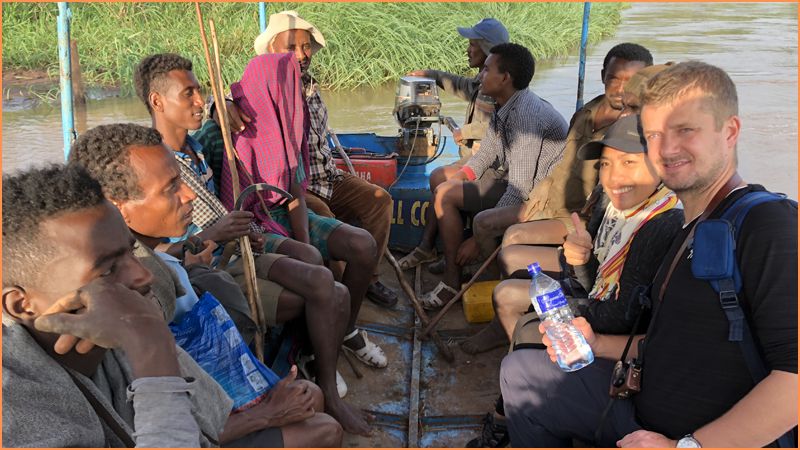
Boat to Blue Nile Falls, Ethiopia as part of our trip with a Tour Operator
Again, to sum up, I conclude the top travel destinations in Africa to be generally safe.
I haven’t seen every corner of the world but I have traveled enough to say that all the things you are paranoid about can happen anywhere. Even if you stay at home, there’s no guarantee that you will be 100% safe. If you are reading this blog, then clearly Africa has made an impression on you. And if the only thing that’s preventing you from going is your paranoia, then I fear that there is more to fear for you because if you live out of fear, then you’re not living at all. It’s okay to be afraid, to be paranoid, as long as you won’t let it stop you, rather use it to focus as you make plans and educate yourself. You are only afraid because you know too little. You don’t need to be a seasoned traveler to nail a trip, all you need is proper planning and common sense.
“If you’re not living on the edge you’re taking up too much space.”
― Stephen Hunt

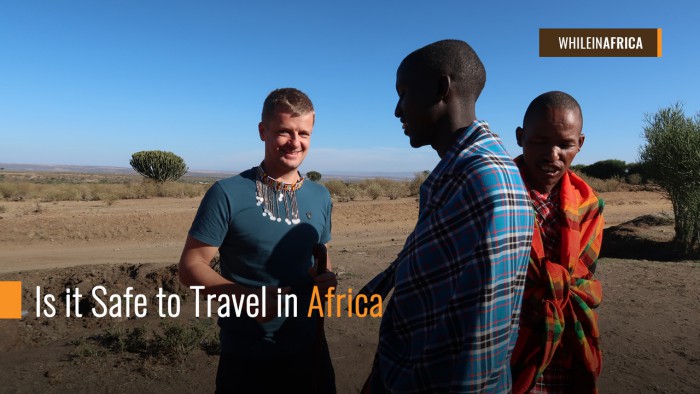




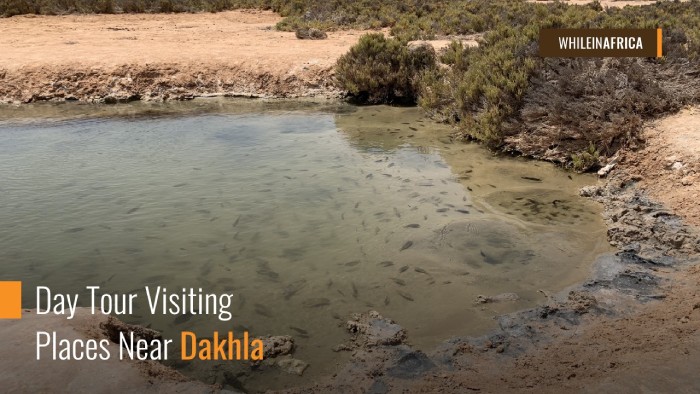
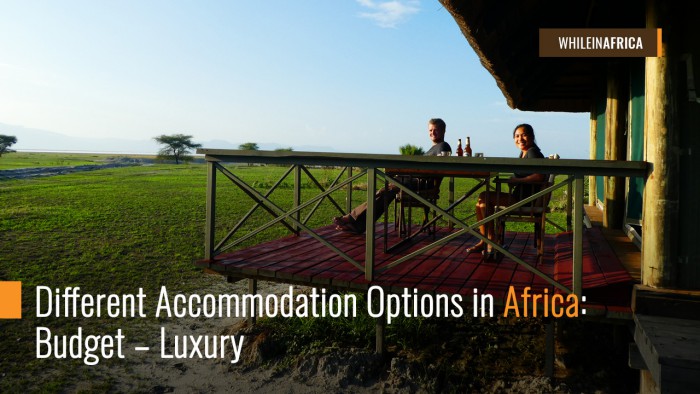
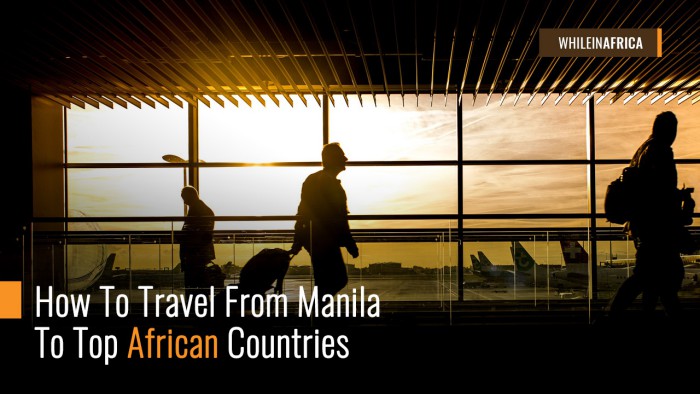

This is amazing. I am actually planning a visit to Africa—Uganda to be precise. Thanks a lot for this post.
Glad you liked it!